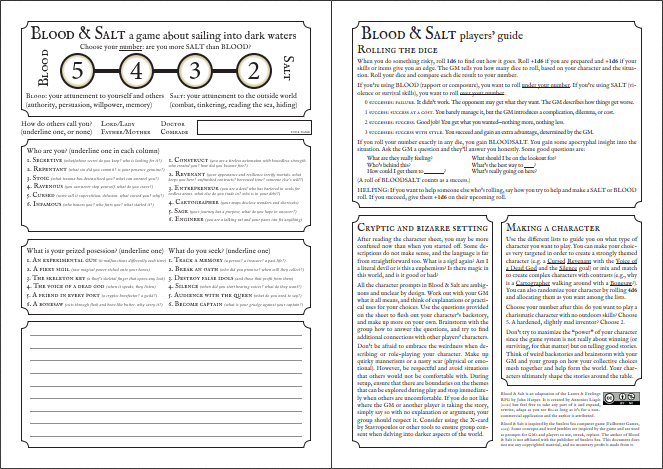Rolling the dice
When you do something risky, roll 1d6 to find out how it goes. Roll +1d6 if you are prepared and +1d6 if your skills or items give you an edge. The GM tells you how many dice to roll, based on your character and the situation. Roll your dice and compare each die result to your number.
If you’re using BLOOD (social skills or self-control), you want to roll under your number. If you’re using SALT (combat or seafaring skills), you want to roll over your number.
- 0 successes: failure. It didn't work. The opponent may get what they want. The GM describes how things get worse.
- 1 success: success at a cost. You barely manage it, but the GM introduces a complication, dilemma, or cost.
- 2 successes: success. Good job! You get what you wanted—nothing more, nothing less.
- 3 successes: success with style. You succeed and gain an extra advantage, determined by the GM.
If you roll your number exactly in any die, you gain BLOODSALT. You gain some apocryphal insight into the situation. Ask the GM a question and they'll answer you honestly. Some good questions are:
- What are they really feeling?
- Who's behind this?
- How could I get them to ?
- What should I be on the lookout for?
- What's the best way to ?
- What's really going on here?
(A roll of BLOODSALT counts as a success.)
HELPING: If you want to help someone else who's rolling, say how you try to help and make a SALT or BLOOD roll. If you succeed, give them +1d6 on their upcoming roll.
If you’re not taking an action relevant to BLOOD or SALT, you automatically succeed at a cost. You do not roll any dice for this. The GM describes the possible cost, and you decide whether you wish to follow through with it.
Cryptic and bizarre setting
After reading the character sheet, you may be more confused now than when you started off. Some descriptions do not make sense, and the language is far from straightforward too. Am I a devil metaphorically? Is there magic in this world, and is it good or bad?
All the character prompts in Blood & Salt are ambiguous and unclear by design. Work out with your GM what it all means, and think of explanations or practical uses for your choices. Use the questions provided on the sheet to flesh out your character’s backstory, and make up more on your own. Brainstorm with the group how to answer the questions, and try to find additional connections with other players’ characters.
Embrace the weirdness when describing or role-playing your character. Make up quirky mannerisms or a nasty scar (physical or emotional). However, be respectful of other players’ sensitivities. During setup, ensure that there are boundaries on the themes that can be explored during play and stop immediately when others are uncomfortable. If you do not like where the GM or another player is taking the story, simply say so with no explanation or argument; your group should respect it. Consider using the X-card by Stavropoulos or other tools to ensure group consent when delving into darker aspects of the world.
Making a character
Use the different lists to guide you on what type of character you want to play. You can make your choices very targeted in order to create a strongly themed character or mix and match to create a complex character with contrasts (e.g., why does a Sage want an Audience with the Queen?). You can also randomize your character by rolling 4d6 and allocating them as you want among the lists.
Choose your number after this: do you want to play a charismatic character with no self-defense skills? Choose 5. A hardened, slightly mad sailor? Choose 2.
Don’t try to maximize the "power" of your character since the game system is not really about winning (or surviving, for that matter) but on telling good stories. Think of weird backstories and brainstorm with your GM and your group on how your collective choices mesh together and help form the world. Your characters ultimately shape the stories around the table.
